Take them to feel the forest: Winter sensory activities for kids
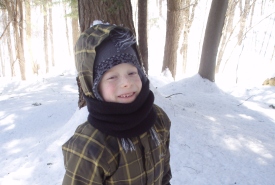
Snowshoeing in Parc de la Gatineau, QC (Photo by DJ)
I‘ve walked in the woods all my life, but it wasn't until I took young children with me that I noticed how fascinated they were with the variety of textures found in their surroundings. Kids can spend hours feeling, building, touching and...
A Canadian winter warrior
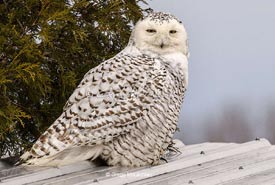
Snowy owl (Photo by Gregg McLachlan)
A few winters back, during the continued irruption of snowy owls into southern Ontario, I was lucky enough to come across a “snowy hot spot” just 25 minutes from my home in Guelph, Ontario. My husband and I have passed many Sundays...
Leave those leaves on the ground
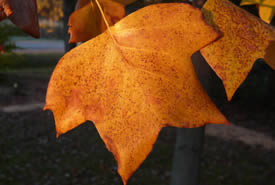
Tuliptree leaf in fall (Photo by Bernt Solymar)
As a child, I heard somewhere that if you catch a leaf as it falls from a tree, it’s good luck. So, naturally, I spent most autumns staring up at the huge trees in the conservation area behind my house, waiting patiently for a leaf to dance...
The places we protect for nature must be connected
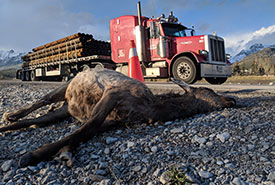
An elk killed by a vehicle in Alberta's Bow Valley. (Photo by Kelly Zenkewich, Yellowstone to Yukon)
Written by Dan Kraus, Wildlife Conservation Society Canada, Karen F. Beazley, Dalhousie University, Jodi Hilty, Yellowstone to Yukon Conservation Initiative, Christopher J. Lemieux, Wilfrid Laurier University and Pam Wright, University of Northern...
Learning new things in familiar places
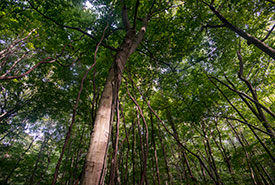
Forest canopy in Backus Woods, ON (Photo by Neil Ever Osborne)
To most people, warmer weather means soaking up the sun at the beach, making a northern weekend getaway to a picturesque cottage, or spending time with friends and family around the campfire or barbeque. While this applies to those of us in the...
World Habitat Day 2021: There is no protected habitat too small to benefit biodiversity
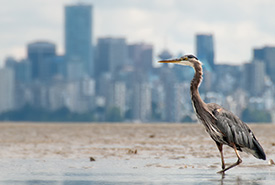
Great blue heron with a cityscape in the background (Photo by iStock)
October 4 is World Habitat Day, which has been celebrated annually by the United Nations since 1986. This year’s theme is accelerating urban climate action. The day is followed by Urban October, a month where we are encouraged to reflect on...
Mouse-ear hawkweed: Friend or foe?
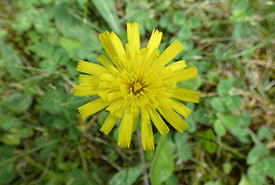
Mouse-ear hawkweed flower (Photo by mhalsted, CC BY-NC 4.0)
A species is considered invasive or alien when it is located outside its natural distribution and threatens humans and/or the environment. There aren’t a lot of clear answers about the impact of certain invasive species and the problem is...
Going paperless: Introducing a new data collection tool
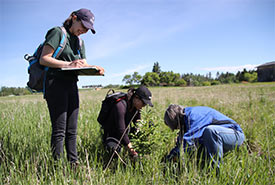
NCC intern and volunteers conducting a tree survey at Upper North Saskatchewan River Basin (Photo by NCC)
Over the past few years, the Nature Conservancy of Canada’s (NCC’s) Saskatchewan Region has used pen and paper to complete their rangeland health assessments. Rangeland health assessments are score-based sheets that are used to monitor...
One weekend in nature across Canada
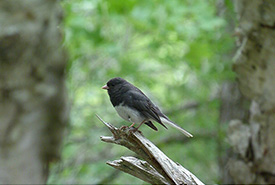
Dark-eyed junco at Shaw Wilderness Park (Photo by Katie Diespecker)
Every summer, the Nature Conservancy of Canada (NCC) hires student interns to work in a variety of areas across the organization. This year’s communications interns, Asha Swann and Katie Diepspecker, lived in different parts of the country:...
Why nature in Canada’s cities could change conservation forever
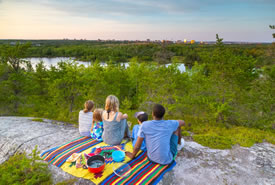
Colpitt Lake in the Shaw Wilderness Park (Photo by Adam Cornick, Acorn Art & Photography)
When the Nature Conservancy of Canada (NCC) was founded almost 60 years ago, there was growing recognition that unmanaged urban expansion was threatening nature. In fact, our first project was to try to save a section of Rattray Marsh along the...

